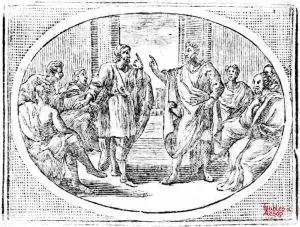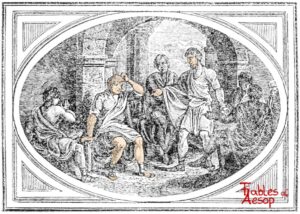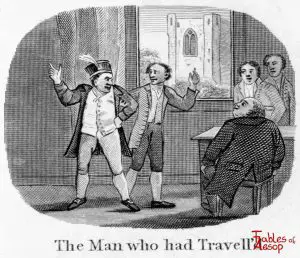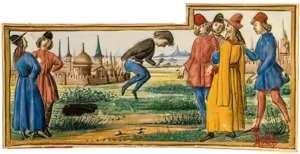Boasting of deeds done is lots of fun; at least until someone calls you on your boasting.
Travelers may take some liberties, but not too many.
A Traveler, on returning, boasted of the many and heroic deeds he had performed. Among those he boasted that when in Rhodes he had leaped further than anyone else found possible and that he could call upon many in Rhodes who could stand as a witness. “There is no need of witnesses,” said a bystander, “simply pretend this is Rhodes and leap for us.”

Aesop For Children (The Leap at Rhodes)
A certain man who visited foreign lands could talk of little when he returned to his home except the wonderful adventures he had met with and the great deeds he had done abroad.
One of the feats he told about was a leap he had made in a city Called Rhodes. That leap was so great, he said, that no other man could leap anywhere near the distance. A great many persons in Rhodes had seen him do it and would prove that what he told was true.
“No need of witnesses,” said one of the hearers. “Suppose this city is Rhodes. Now show us how far you can jump.”
Moral
Deeds count, not boasting words.

Townsend version
A man who had traveled in foreign lands boasted very much, on returning to his own country, of the many wonderful and heroic feats he had performed in the different places he had visited. Among other things, he said that when he was at Rhodes he had leaped to such a distance that no man of his day could leap anywhere near him as to that, there were in Rhodes many persons who saw him do it and whom he could call as witnesses. One of the bystanders interrupted him, saying: “Now, my good man, if this be all true there is no need of witnesses. Suppose this to be Rhodes, and leap for us.”

Samuel Croxall
ONE who had been abroad, at his return home again, was giving an account of his travels; and, among other places, said he had been at Rhodes where he had so distinguished himself in leaping, an exercise that city was famous for, that no Rhodian could come near him. When those who were present did not seem to credit this relation so readily as he intended they should, he took some pains to convince them of it by oaths and protestations; upon which, one of the company rising up, told him, he need not give himself so much trouble about it, since he would put him in a way to demonstrate it in fact: which was, to suppose the place they were in to be Rhodes, and to perform his extraordinary leap over again. The Boaster, not liking this proposal, sat down quietly, and had no more to say for himself.
THE APPLICATION
It is very weak in all men, as well those who have travelled, as those who have not, to be solicitous with their company to believe them, when they are relating a matter of fact, in which they themselves were a party concerned. For the more urgent a man appears at such a time, in order to gain credit, the more his audience is apt to suspect the truth of what he relates. They perceive his vanity is touched more than his honour, and that it is his ability, not his veracity, which he cannot bear to have questioned. And, indeed, though a man was ever so fully satisfied with such a truth himself, he should consider, that he is still as far from being able to convince others, as if he were altogether ignorant of it. Therefore, in all cases, where proper vouchers are expected, we had better be contented to keep our exploits to ourselves, than to appear ridiculous, by contending to have them believed. How much more then should travelled gentlemen have a care how they import lies and inventions of their own, from foreign parts, and attempt to vend them, at home for staple truths. Every time they utter a falsehood, they are liable, not only to be suspected by the company in general, but to be detected and exposed by some particular person, who may have been at the same place, and, perhaps, know how to convict their forgery even to a demonstration.

Thomas Bewick
One who had been abroad, was giving an account of his travels, and among other places, said he had been at Rhodes, where he had distinguished himself so much in leaping, an exercise which that city was famous for, that not a Rhodian could come near him. When those who were present did not seem to credit this relation so readily as he intended they should, he took some pains to convince them of it by oaths and protestations: upon which, one of the company told him he need not give himself so much trouble about it, since he would put him in a way to demonstrate the fact; which was, to suppose the place they were in to be Rhodes, and to perform his extraordinary leap over again. The boaster, not liking this proposal, sat down quietly, and had no more to say for himself.
APPLICATION.
We had better be contented to keep our exploits to ourselves, than to appear ridiculous by attempting to force a belief of that which is improbable; and travelled gentlemen should have a care how they import falsehoods and inventions of their own from foreign parts, and attempt to vend them at home for staple truths. It cannot be too strongly impressed upon the mind, that a lie is upon all occasions degrading to the person who utters it, and should be most scrupulously avoided, not only on account of its baseness, but because it is impossible to foresee in how many troubles it may involve him who passes it off. It will not always receive credit, and is ever liable to detection. When it is calculated for wicked purposes, it will deservedly incur punishment; and when it is of a harmless or insignificant nature, it will even then often expose its author to contempt and ridicule; and vanity never mistakes its end more grossly, than when it attempts to aggrandize itself at the expence of truth.
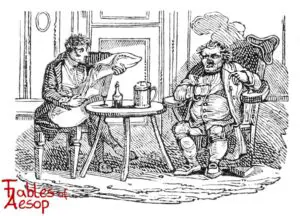

Jefferys Taylor (The Man Who Had Travelled)
A MAN who had travell’d, his story unravell’d,
And strange were the things he related;
Till his hearers began to discredit the man;
For they were with his miracles sated.
So he rack’d his invention, to keep their attention,
And at last he declar’d to them all
That he leap’d from the dome of St. Peter’s at Rome,
Without being hurt by his fall.
“For,” said he, “when at Rhodes, I conformed to their modes,
And in leaping became so expert,
That now should they toss us clean o’er the Colossus,
I am certain I should not be hurt!”
This all were agreed, was surprising indeed,
Provided the whole were authentic;
Then the truth to confirm, he employ’d ev’ry term
In Sheridan, Johnson, or Entick.
“But, good sir,” said a friend, “all our scruples must end,
If you would but just leap from that steeple;”
But our hero thought fit, at that hint to retreat
From a pack of incredulous people.
When people assert an achievement expert,
And have only assertions to show it;
There is ground to suspect that they are not correct;
The best proof of all is to do it.

JBR Collection
A Man was one day entertaining a lot of fellows in an ale-house with an account of the wonders he had done when abroad on his travels. “I was once at Rhodes,” said he, “and the people of Rhodes, you know, are famous for jumping. Well, I took a jump there that no other man could come within a yard of. That’s a fact, and if we were there I could bring you ten men who would prove it.” “What need is there to go to Rhodes for witnesses?” asked one of his hearers; “just imagine that you are there now, and show us your leap.”

L’Estrange version
A vain fellow that had been abroad in the world, would still be tiring all peoples ears at his return, with stories of his wonderful actions and adventures in his travels; and particularly, he told of a leap he took at Rhodes, that no body there could come within six foot on’t. Now this (says he) I am able to prove by several witnesses upon the place. If this be true (says one of the company) there’s no need of going to Rhodes for witnesses: do but you fancy this to be Rhodes, and then shew us the leape.
Moral
Travellers have a kind of privilege to romance it; and to tell stories at large. And for those that doubt the truth of the matter, they had e’en better pass it over than go to disprove it.

Crane Poetry Visual
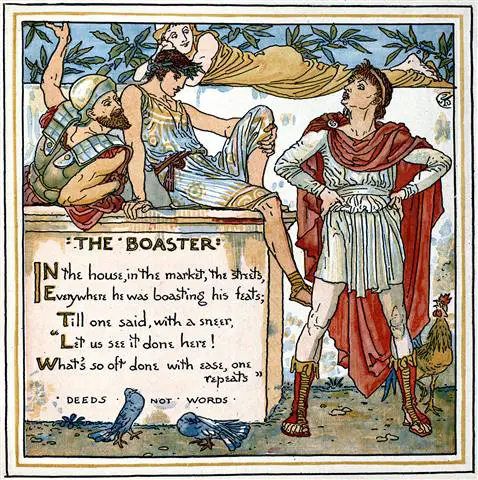
In the house, in the market, the streets,
Everywhere he was boasting his feats;
Till one said, with a sneer,
“Let us see it done here!
What’s so oft done with ease, one repeats.”
Deeds not words.

Gherardo Image from 1480

Iactator in Patriam Reversus
Homo quidam, reversus in patriam, unde aliquot abfuerat annos, ubique gloriabatur iactabatque praeclara sua facinora. Inter alia narrabat in insula Rhodo saliendo se vicisse optimos in hac exercitatione artifices. Ostendebat etiam spatii longitudinem quam praeter se nemo potuisset saltu superare, cuius saltus testes se habere universos Rhodios dicebat. Tum unus ex adstantibus “Heus tu,” inquit, “si vera narras, nihil opus est istis testibus. Hic Rhodum esse puta, hic salta.”
Perry #033
